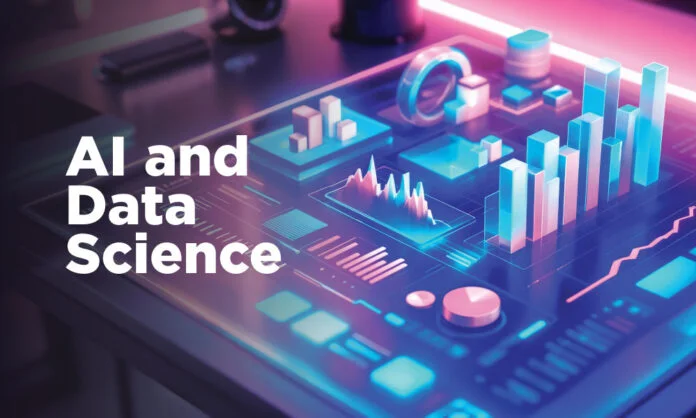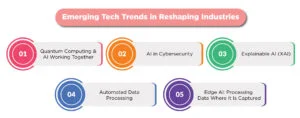In 2025, AI and data science technologies are set to change how industries operate. In healthcare, finance, and retail, new data tools will modify business practices and customer engagements. These advancements have already improved areas like safety and healthcare.
In this blog, we will look at five key trends in data science and technology that will reshape industries in the future.
What is Artificial Intelligence (AI)?
Artificial Intelligence (AI) refers to the technology that allows computers or machines to perform tasks which is associated with human intelligence. This includes recognizing speech, understanding images, or even making decisions. AI learns through experience and continues to get better with time. It can solve complex problems in fields such as big data analysis and predicting future trends much more quickly than humans.
What is Data Science?
Data science is the collection and checking of large datasets, which gives useful information. It helps businesses or organizations understand trends, patterns, and behaviors derived from the data. It combines tools and techniques and helps to guide decision-making in marketing, healthcare, finance, and much more.
For instance, reports indicate that the demand for data science skills will grow by over 25% each year in the next few years. This rise is due to the rapid increase in data and the need for better analysis.
Emerging Tech Trends in Reshaping Industries
-
Quantum Computing and AI Working Together
Quantum computing is set to bring significant changes. These computers are much faster than regular ones, allowing for quicker solutions to complex problems. This technology will help industries tackle challenges like improving supply chains and discovering new medicines. It will enable businesses to make better decisions more rapidly, especially in healthcare, finance, and logistics, leveraging both AI and data science.
Why it matters: Quantum computing allows businesses to make faster and more accurate decisions, leading to more efficient operations worldwide.
-
AI in Cybersecurity
This will allow AI to play a bigger role in business protection as cyber threats become more complex and difficult. Traditional security methods usually can’t keep up with hackers, but advanced technology can identify threats much faster, sometimes even before they happen. These systems will be monitoring networks in real-time, flagging unusual activity and automatically stopping attacks by 2025. This will be critical for banks, healthcare, and government sectors.
For example, according to a report, by 2025, cybersecurity systems will detect and respond to threats in real-time, significantly reducing the risk of data breaches. This will be especially important for the banking, healthcare, and government sectors.
Why it matters: AI and data science-powered cybersecurity will bring quicker and more effective protection from data breaches while keeping sensitive data safe and out of the costliest attacks.
-
Explainable AI (XAI)
The increasing use of technology in the decision-making process requires clear, lucid, and understandable information. Explainable AI (XAI) helps people understand these systems’ mechanisms of making such decisions. Of course, especially in healthcare, finance, or law, reasons for a given decision are sometimes as important as the decision itself.
For instance, healthcare practitioners should trust AI and data science recommendations, but such trust can only occur if the reasoning behind those recommendations is understood clearly. According to sources, Explainable AI (XAI) is important for building trust in AI systems, especially in critical areas like healthcare and finance. XAI helps users understand how AI makes its decisions.
Why it Matters: XAI will be key to establishing trust between humans and AI, therefore making the latter more trusted and easier to adopt in high-impact fields like healthcare and finance.
-
Automated Data Processing
The amount of data businesses face is rising rapidly, and it is dealt with slowly and is prone to error. Much of this is likely to be sorted automatically by AI and data science by 2025. AI can, in real-time, sort and analyze huge amounts of data, showing trends that human brains might not catch. This means that in e-commerce and marketing, more personalized recommendations will be given to customers. Also, it will increase sales and engagement.
Why it matters: The automation of data processing via AI and data science will enhance the ability to make faster decisions that are information-based and improve competitiveness in the data-driven world.
-
Edge AI: Processing Data Where It Is Captured
Edge AI processes data in real-time on the device it is created on a smartphone or IoT device, or more likely, self-driving cars. It does not have to send the data through the cloud for analysis. Thus, edge AI allows devices to make fast decisions without waiting for data to travel. This will be critical in real-time decision-making areas of industries such as healthcare and manufacturing.
Why it matters: Edge AI will make devices efficient, reduce cloud storage, and help make decisions instantly where data is gathered.
The Future of AI and Data Science
By 2025, these trends will have a massive influence on industries, propelling Artificial intelligence and data science to places they have never reached before, quantum computing, automated data processing, and edge AI are a few of the ideas being floated.
The growth of AI and data science is calling for the preparedness of business organizations as new technologies come about. The future, in terms of the next few years, will shape exactly how these technologies transform the fabric of life and businesses. And the companies that move first by embracing those changes will lead to an exciting future.
To learn more about AI and data science, visit us at YourTechDiet!
Read More:


